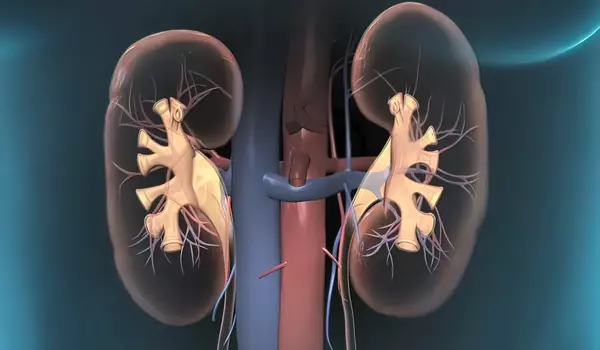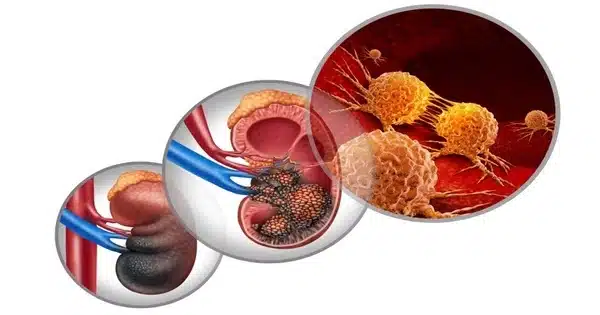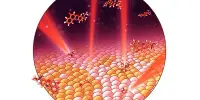Gene signatures can indeed provide useful information about kidney cancer prognosis. Gene signatures are collections of genes that are collectively analysed to determine their expression levels or mutations. Researchers can gain insights into the underlying molecular characteristics of a tumour and predict how it will behave or respond to treatment by examining the activity of specific genes or groups of genes.
The activity of four specific genes in cancer cells appears to be able to predict the risk of the tumour spreading and the patient’s chances of survival in patients with kidney cancer. Researchers from Sweden’s Karolinska Institutet demonstrated this in a preclinical study published in Nature Communications.
“This has the potential to become a tool for gaining a better understanding of the disease’s course at an early stage.” Patients with a cancer profile with a high likelihood of spreading could then be closely monitored to detect and treat any tumour growth,” says Ninib Baryawno, senior researcher at Karolinska Institutet’s Department of Women’s and Children’s Health and the study’s last author.
The most common type of kidney cancer in adults is clear cell kidney cancer. The prognosis is often favourable if the tumour is confined to the kidneys, but if it has spread to the skeleton, which occurs in about one-third of patients, the five-year survival rate is only about 10%.
We hope that our findings will lead to further research into factors that affect the tumour microenvironment, which will eventually lead to new ways to treat cancer relapse and spread. We hope that it will help us answer the question of why immunotherapy does not work in some kidney cancer patients.
Adele Alchahin
Immunotherapy, also known as checkpoint inhibitors, has become an important treatment option for patients with clear-cell kidney cancer in recent years. However, cancer cells frequently develop resistance to treatment, which may be attributed in part to factors in the environment surrounding the cancer cells, known as the tumour microenvironment.
The current study looked at samples from nine patients with clear-cell kidney cancer. Researchers from Karolinska Institutet collaborated with clinicians from Massachusetts General Hospital, where the patients were recruited, and computational scientists from Harvard Medical School in Boston, USA, on the study.
To make matched comparisons and control for inter-individual variation, tumour tissue and nearby normal kidney tissue were collected from the same patient. The cells were studied using single-cell analysis, a sequencing technique that allows researchers to investigate each individual cell in the tissue as well as gene expression, or which genes are active, in individual cells.
The researchers also compared primary tumour tissue from the kidney with tissue from skeletal metastases in two patients.

The research shows that a genetic signature made up of four specific genes can predict whether a tumour will spread to the skeleton and how long it will live. Simultaneous overexpression of these genes (SAA1, SAA2, APOL1, and MET) indicates that the patient is more likely to develop a cancer that spreads and has a poorer prognosis.
The researchers confirmed the link between the gene signature and the risk of spreading when they examined tumour cells from bone metastases in seven patients with metastatic clear cell kidney cancer.
Moreover, the study shows that the microenvironment of the tumour inhibits the immune system, and the researchers suggest several possible targets for drugs that may be interesting to investigate further. These were identified with computer simulations of cell interactions.
The study provides important biological knowledge about the interaction between tumour cells and their microenvironment in clear cell kidney cancer, the researchers say.
“We hope that our findings will lead to further research into factors that affect the tumour microenvironment, which will eventually lead to new ways to treat cancer relapse and spread.” The next step for us will be to investigate how metastases in the bone marrow and skeleton differ from local tumours in the kidney, as well as how bone marrow in patients with kidney cancer metastases in the skeleton differs from healthy bone marrow. “We hope that it will help us answer the question of why immunotherapy does not work in some kidney cancer patients,” says Adele Alchahin, PhD student at Karolinska Institutet’s Department of Women’s and Children’s Health and one of the study’s first authors.
The KI researchers involved in the publication state that there are no potential conflicts of interest. Other authors have links to various pharmaceutical and biotechnology companies in the form of, among other things, founding and consulting commitments. See the scientific article for further information.















